Learn How To Say “I Know” In Korean
In this short lesson, you will learn how to say “I know” in Korean. You may be surprised to hear that “I know” is used incredibly often in Korean conversations. In fact, if you’ve ever watched Korean dramas, you’ve probably heard the characters saying 알아요 (arayo) or 알았어 (araseo) many times. Below we will teach you the meaning of these words and the different ways to say “I know” in Korean, and provide plenty of example sentences to help you understand.
“I Know” In Korean
알다 [al-da] = To Know
The basic verb form “to know” in Korean is 알다 [al-da]. To say “I know” in Korean, you must take this basic verb form and conjugate it into the present tense.
알아요 [a-ra-yo] = I Know (Polite)
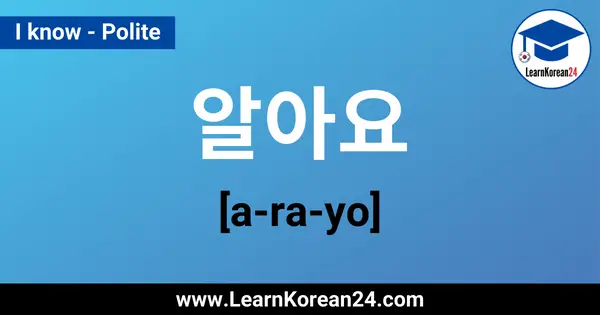
The most common way to say “I know” in Korean is 알아요 [a-ra-yo]. This is the verb 알다 (to know) conjugated into the present tense with the polite ending 요 attached. As this is the polite way to say “I know”, you can use this in most situations and, you will sound polite and respectful. Here is an example sentence using 알아요 [a-ra-yo]:
A: 그 사람을 알아요? [geu sa-ra-meul a-ra-yo?] = Do you know that person?
B: 네, 알아요. [ne, a-ra-yo] = Yes, I know (that person).
압니다 [am-ni-da] = I Know (Formal)
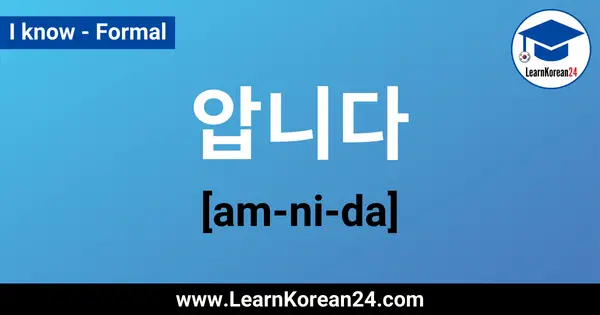
The formal way to say “I know” in Korean is 압니다 [am-ni-da]. As this is a formal expression, you can use it when you want to say “I know” to people older than you and in situations when you want to sound extra respectful. Here is an example sentence using 압니다 [am-ni-da]:
A: BTS 압니까? [BTS am-ni-kka?] = Do you know BTS?
B: 네, 압니다. [ne, am-ni-da] = Yes, I know (them).
알아 [a-ra] = I Know (informal)
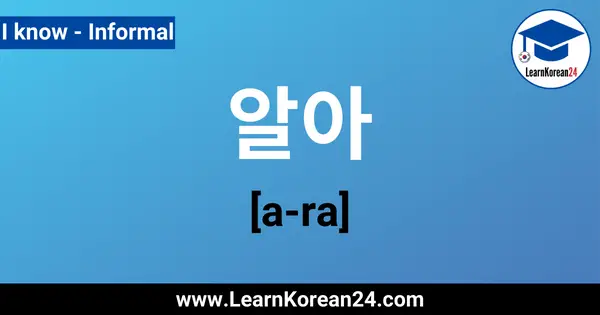
The informal way to say “I know” in Korean is 알아 [a-ra]. As you can see, there is no polite or formal ending attached, and so this expression should only be used with close friends/family and those much younger than you. In most cases, you should use polite or formal expressions. Here is an example sentence:
A: 포켓몬 알아? [po-ket-mon a-ra] = Do you know Pokemon?
B: 응, 알아. [eung, a-ra] = Yes, I know (Pokemon).
“I Got It” In Korean
The following expressions also use the verb 알다 (to know) but are used in situations where you want to say “I got it” or “I understood.“.
알았어 [a-ra-sseo] = I Got It (informal)
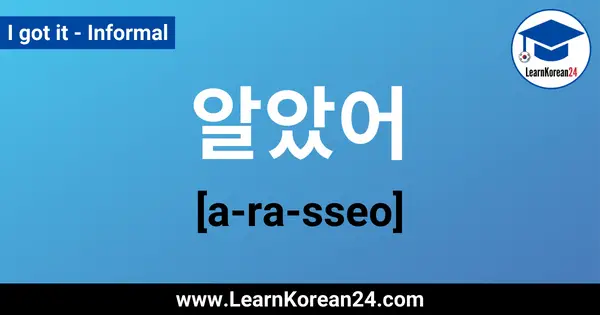
알았어 [a-ra-sseo], sometimes romanized as arrasseo or araso, means “I got it“. This expression is made from the verb 알다 (to know) conjugated into the past tense. So, 알았어 [a-ra-sseo] literally means “I knew it”, but a better translation in English is “I got it.” To help you understand what we mean, let’s look at an example sentence:
A: 오늘 저녁에 늦지 마! [o-neul jeo-nyeo-ge neut-ji ma] = Don’t be late tonight!
B: 알았어, 엄마. [a-ra-sseo eom-ma] = OK/Got It/Understood, mom.
As you can see, 알았어 [a-ra-sseo] also functions as “OK” in Korean in some situations.
알았어요 [a-ra-sseo-yo] = I Got It (polite)
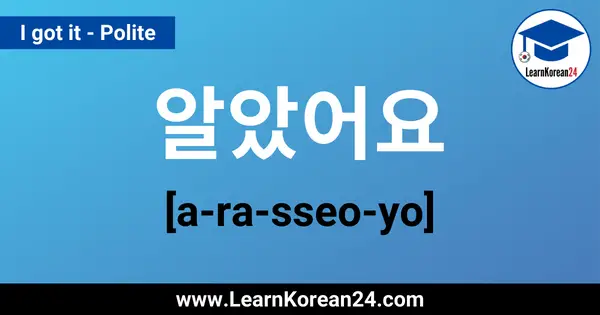
알았어 [a-ra-sseo] is an informal expression, and so you should not use this with strangers and people older than you. Instead, you should use the polite expression. To make 알았어 polite, simply add 요: 알았어요 [a-ra-sseo-yo]. Here is an example sentence:
A: 방금 이메일 보냈어요. [bang-geum i-me-il bo-nae-sseo-yo] = I just sent you an email.
B: 알았어요. [a-ra-sseo-yo] = OK. / Got it. / Understood.
알겠어요 [al-ge-sseo-yo] = I Got It (softer)
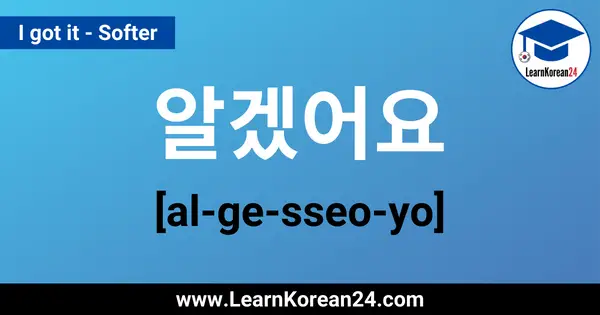
알겠어요 [al-ge-sseo-yo] is a softer way to say “I got it” in Korean. This expression is made up of the verb 알다 (to know) with the ending 겠 attached, which roughly translates as ‘guess’. So, 알겠어요 [al-ge-sseo-yo] is like saying, “I guess I understood.” / “I guess I got it.“.
So now you know how to say “know” do you know what you should learn next? Learn more useful Korean phrases or start our free online Korean course.
STUDY ONLINE WITH KOREAN ARAH!
Ready to take your Korean to the next level?
Get One-on-One Korean lessons from a qualified and experienced Korean language tutor!

